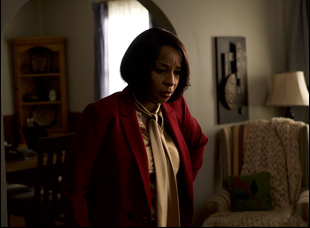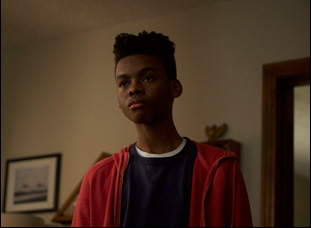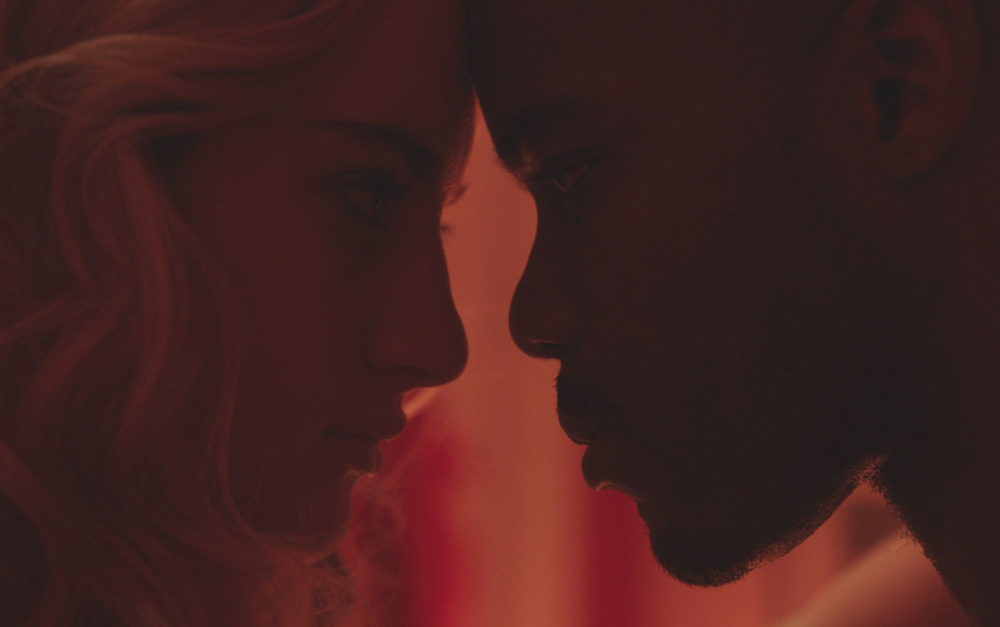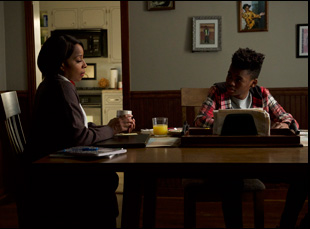Kerem Sanga had wondered if he had gone a little too far on “The Violent Heart” in setting up a scene in which Daniel (Jovan Adepo) reveals to Cassie (Grace van Patten) why exactly he has a criminal record, a case that’s resurfaced now that he’s applying to the Marine Corps. The two have traveled all the way out from the burbs to Nashville where Daniel hopes to secure an endorsement of a state official will burnish his credentials, but this incident from his past comes as a surprise to Cassie, who he just met only recently after she showed up at the repair shop where he works with a broken-down car, and the revelation strikes an uncomfortable note as the evening wears on in Music City. Beyond the impressive pair of actors he had in front of him, Sanga had an entire crew excited by the possibilities of the shifting emotional currents in the scene, with cinematographer Ricardo Diaz smearing gel on the lens of his camera to get the light to frolic between vibrant reds and greens and production designer Diana Rice calling in a friend to add graffiti to the back alley where the drama unfolds.
“I remember looking at that and thinking this looks like a Prince video and people will start dancing, so maybe we’ll tone it down just a little bit,” laughs Sanga, who while never one to shy away from big moments in previous kind-hearted comedies such as “The Young Kieslowski” and “First Girl I Loved” never lets them obscure the humanity behind them. “But everybody understood we’re trying to turn the volume up on everything about this movie, so the departments just ran with it, and I got to sit back and watch it and say, ‘Maybe we’ll just edge it down a little bit in case I was getting a little scared.’”
Ultimately, Sanga finds just the right level of edge for “The Violent Heart,” a twisty melodrama where a burgeoning romance between Daniel and Cassie threatens to be undone by what they come to realize about the tragic death of Daniel’s older sister years earlier. Living in the same town but miles apart quite literally in physical distance as well as social standing, the couple start to wonder if they share a different connection than the one they feel for each other as their desire to start new lives stems in part from a growing distrust of their parents, whether it’s Cassie’s father (Lukas Haas) or Daniel’s mother (Mary J. Blige). As Cassie’s about to leave high school and Daniel’s only a few years removed, suspicions are all that’s needed to ignite a change in scenery, but the writer/director begins to pinpoint how there are places within themselves that they’ll never be able to leave behind and with Adepo and van Patten threatening to burn up the screen, the film crackles with the potential of exploding into a full-on conflagration at every turn.
Scheduled to premiere at the Tribeca Film Festival before the coronavirus made other plans, “The Violent Heart” is only now finally making its way into the world and recently Sanga spoke about going all in on the romance and how a film that seems on the surface like a departure from his previous films allowed him to grow as a filmmaker.
I had this idea for a just so story, where everything fit together and it was like reading a little storybook. I was messing around with [the idea] and for the longest time, I thought it was too melodramatic or too crazy or too many twists and turns or genres – mystery, romance, thriller – so I couldn’t really figure out how to do it. Then one day I was just watching old movies and I thought, “What if you do it in this big way? What if you didn’t shy away from all that and you just say here it’s going to be this crazy ride.” Thankfully, a bunch of producers agreed with me.
Is there something about this particular age that keeps you coming back?
Definitely when this movie was done, I thought, “Wow, there’s a lot of characters within this time in their life,” but within this one specifically, it wasn’t so much the vicissitudes of high school, but more the demands of the plot. To me, this is a story-first movie and it just so happened for all the ages and the years for everybody to work out, these people would be in these points in their lives, but maybe it was a reaction to the other movies that I did [in that] I don’t want to spend any time at school really. I want to do a movie about characters who principally live outside of those environments, so for Grace’s character, she’s just biding her time until the next phase in her life, so she’s got time on her hands to explore this romance and unknowingly, this mystery/thriller that she falls into.
One of the exciting elements of the film is how geography becomes a real part of the structure of the film where cars are needed to get from one place to another and you have a sense of where everyone lives. Was Nashville in the mix early as a setting?
I always think I’m going to get away from true distances and places and then I just can’t and when it came time to figure out where to shoot this, we were looking for a city that had a college town that was also the capital but was also probably in the south. The math of the production worked out that oh Nashville would be a really good spot, and once we decided on Nashville, I went through the script and looked at pictures of Nashville and we did some scouting and I thought, “Okay, I’m going to try and make the geography of that the real geography of this place” because that’s something I always like to see as well. It gives you a north star because you’re like, “This city is a hundred miles outside of [the capital], so they could take a motorcycle to go from point A to point B…” That’s something I’m very attuned to, which is the actual geography of where everybody is living because that just has such a bearing on your life, on where you go and how you plan your day, so I wanted to make it true to where we were shooting and not say, “Oh, this is upstate New York, but we’re just going to pretend it’s somewhere else.” Then you have to shoot around things and you can’t have a big nice wide shot, so I thought, “Why not? Why don’t we say it’s here?” And mold the story to make it work.

That was in draft four, and literally, we’re going to shoot the thing, and Ric [Diaz], the [cinematographer] loves to give me a hard time, and he was telling me how on the nose the bit of exposition is because it’s a movie about family and it’s about this kid figuring out the real relationships between all of his family members. To be completely honest with you, I just thought I was giving him some side project to do the drama within the class, but when Ric was giving me a hard time, he actually gave me a great idea, which is that I needed to lean into this what I thought was business that’s thematically very relevant to the movie, so I gave him some stuff to say about each person and within the business of the scene, you get to show how this guy feels about his family outside of the bounds of his family because we often don’t tell people how we feel about them unless we’re away from them. You’re always trying to come up with ways to do exposition, but that particular one just happened to be something that I didn’t realize it was doing what it was doing.
Was it fun to edit where you’re laying the groundwork to a big surprise like this has?
I always love editing, but then there’s this excruciating part of it, which is that things don’t work until they work. This one was tough because there’s so many different ways you could go with it and at the end of the edit, we ended up hewing very closely to what the script was, but in between, we tried all sorts of things to set up the ending, [like] what if you sprinkled more flashbacks throughout the movie instead of getting more of it at the beginning like a prologue? We went down so many rabbit holes and I had so many long walks back home, wondering what we’re going to do, so was it fun to edit? Only in retrospect. At the time, it was a little stressful.

They’re both tremendous actors, but every actor, they both have very different styles. What I loved about Grace is she’s so precise, which really worked for her because she has so many scenes where she’s texting and I’m telling her in the moment what’s going on in the phone and she’s hitting all these notes that is just a joy to watch somebody like that, like an archer who can hit the bullseye every time. Then with Jovan, it was different but equally fun because I would just direct Grace in something and then go to lunch and then after lunch, I start talking to Jovan and he’s in a totally different headspace because he really identified with this movie and he brought so much of himself and his work to it. I would be in the same mode of how I was talking to Grace and then he would jerk me out of that and remind me that [his character] is a really young guy who had this terrible thing happen to him and all of a sudden, I was really into the narrative again because this is his story.
It was just such a joy to get to learn really from them how to get the most from people and how to provide the best environment for all the artists to do their thing because the more I do this, the more I actually am able to let go of being so “Do this here and do that there” and watch them bring something that I never could’ve thought of. When they have their scenes together, it’s like they’re working it out half the time and I’m providing a nice, quiet environment for them. That becomes my job.
“The Violent Heart” is now available in theaters, on VOD and iTunes.





